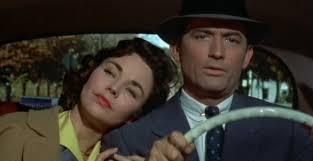 The Man in the Gray Flannel Suit (1956) is an ambitious, overlong, mismatched package of ideas, characters and story lines. Adapting Sloan Wilson's novel, Nunnally Johnson tries too hard to fit them all into a single feature. Credit the actors and Johnson's script for redeeming
The Man in the Gray Flannel Suit (1956) is an ambitious, overlong, mismatched package of ideas, characters and story lines. Adapting Sloan Wilson's novel, Nunnally Johnson tries too hard to fit them all into a single feature. Credit the actors and Johnson's script for redeemingTom Rath (Gregory Peck) struggles to balance business and family life in 1950s America. His wife Betsy (Jennifer Jones) urges him to pursue a new job and buy a bigger house. Rath is hired by broadcasting executive Hopkins (Fredric March), but finds himself unsatisfied with the unscrupulous games necessary to advance his career. Things grow more complicated when Betsy demands that they move into her parents' estate, leading to a feud with their caretaker (Joseph Sweeney). Then Italian girl Maria (Marisa Pavan), Tom's wartime mistress, arrives with an illegitimate son that turns things upside down.
The Man in the Gray Flannel Suit plays like an overachieving effort to hook all moviegoers. There are violent war flashbacks, a furtive forbidden romance, a scathing look at business and materialism and two, equally crushing domestic dramas (Tom's dilemmas and Hopkins' own troubles) vying for space. Too well-made to be boring, it nonetheless echoes the structure of its literary source without the texture or, frankly, coherence. Just when we're growing absorbed in Tom's despair, Johnson cuts to a long battle that dissipates, rather than complements, its impact. This causes a logy feel that often makes the 153 minute run time a chore.
When Gray Flannel Suit doesn't always hang together, at least it provides thematic interest. Tom becomes a stand-in for the disaffected Eisenhower generation; uprooted and changed by WWII, he fights traumatic war memories from an affair to accidentally killing one of his subordinates. Despite his seemingly comfortable life, Betsy isn't satisfied, resulting in an obsession with status triggering battles with servants, battles over estates and Tom submerging himself in a job defined by deception.
Thus Flannel Suit becomes another '50s drama about capitalist conformity. Tom butts heads with a cruel boss (Henry Daniell) who can only relax in a reclining office chair, clashing over speeches and personality. Hopkins neglects his wife (Ann Harding) and alienates his headstrong daughter (Gigi Perreau), plunging himself into an idealistic but unrealistic campaign for mental health. Thus social engineering replaces intimate concerns, an abstraction more feasible than reality; Tom stands in for Hopkins' departed son, leading him to offer some hard-earned advice. It's a familiar enough conflict that nonetheless strikes a chord.
Gregory Peck does admirable work, allowing Tom's quiet agony to peer out beneath his usual rectitude. Fredric March gives a professional turn but his character seems overdrawn. Jennifer Jones invests her potentially shrewish character with warmth and sympathy, while Marissa Pavan offers unremitting sweetness. Lee J. Cobb has a near-superfluous role, while Arthur O'Connell's nebbish subordinate quickly grows irritating. Faring better are Henry Daniell is a cold, sneering manager and Keenan Wynn as Tom's army buddy.
Today, The Man in the Gray Flannel Suit would make for an ideal miniseries or long running show which allowed its themes and story arcs to play out more comfortably. (Certainly Mad Men reflects many of them in more potent, slow-burn form.) Johnson's film is an admirable, intermittently interesting effort, yet the end result bites off more than it can chew.

